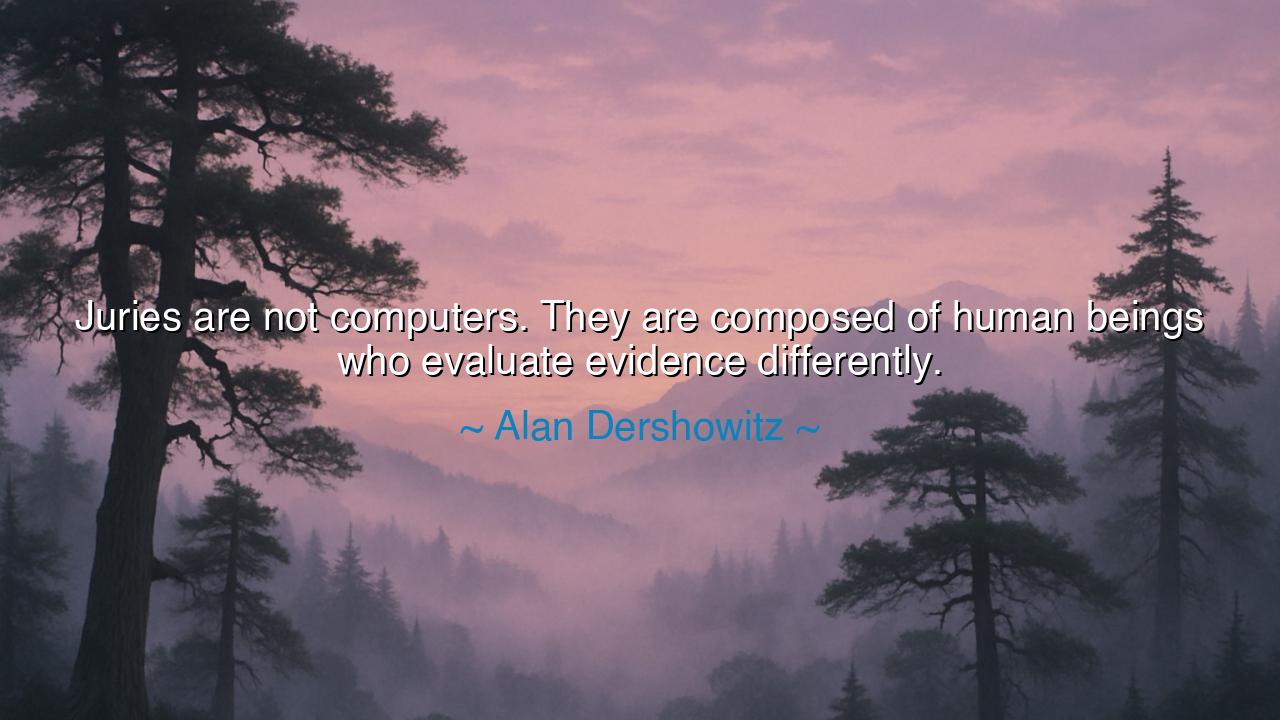
Juries are not computers. They are composed of human beings who
Juries are not computers. They are composed of human beings who evaluate evidence differently.






Gather, O Seekers of Justice, and hear the words of Alan Dershowitz, a voice of reason in a world often overshadowed by emotion and haste. He speaks thus: "Juries are not computers. They are composed of human beings who evaluate evidence differently." This truth, though simple, carries a weight of wisdom that resonates across the ages. In it lies the deep understanding that justice, though grounded in reason, must always be tempered by human nature, with all its complexities, biases, and imperfections.
Juries, those sacred bodies entrusted with the task of deciding the fate of the accused, are far from mechanical, though society sometimes wishes them to be. In an age where machines—computers, to be precise—can calculate, store, and retrieve information with flawless precision, we often look to technology as the ultimate symbol of objectivity and efficiency. Yet, Dershowitz reminds us that the jury, as composed of mortal men and women, cannot be reduced to mere calculations or equations. They do not, and cannot, evaluate evidence with the cold detachment of a machine. Instead, they are guided by the warmth of their hearts, the intricacies of their experiences, and the biases formed by the lives they have lived. Justice, then, must be seen not through the lens of perfect logic, but through the lens of human understanding—which is always subject to the vagaries of perception and belief.
Consider the example of the ancient Athenian courts, where jury trials were an essential part of democratic life. The Athenians had a system in which large juries, often numbering in the hundreds, would be drawn from the people. Their verdicts could determine the fate of great men, such as the philosopher Socrates, who was sentenced to death despite his wisdom and contributions to Athenian thought. The verdict was delivered not by the cold hand of reason alone, but by the voices of human beings who, despite their intellect, were swayed by the passions of the moment. Socrates' trial, for all its philosophical depth, was a reflection of this truth: jury decisions are as much shaped by the character of the jurors as by the evidence before them.
This is where the wisdom of Dershowitz’s words becomes apparent. Juries, being composed of human beings, carry with them the full spectrum of human nature. They bring their values, experiences, and prejudices into the courtroom. No matter how much we strive for objectivity, judgment is never free from the fingerprints of the individual's soul. In the case of Socrates, his intellectualism, his challenge to tradition, and his defiance of authority made him a lightning rod for the passions of the people. Though the evidence against him was flimsy, the jurors’ emotions and preconceptions led them to condemn him. Thus, humanity's influence on judgment is undeniable.
In the modern world, Dershowitz’s observation is no less relevant. We may look at a case through the cold, logical eyes of technology—computers that can store vast amounts of information, algorithms that can compute the probability of guilt or innocence—but we cannot remove the human element from the equation. For just as Socrates’ life was shaped by the biases of the Athenians, so too are the verdicts of today shaped by the people in the jury box. They may be swayed by emotion, perception, and cultural narratives, even when the evidence suggests otherwise.
Yet, this truth is not a cause for despair, but for understanding. Justice, in its most noble form, seeks to balance reason with compassion, facts with humanity. The lesson is clear: while the pursuit of truth is vital, we must also accept the limits of human judgment. Juries, though imperfect, embody the struggle between our rational minds and our emotional hearts. Technology may provide us with answers that are clear and precise, but it is the human soul, in its fullness, that truly judges. This is the beauty and the tragedy of our shared existence—the tension between logic and emotion, between what is and what we feel should be.
Thus, the lesson, O Seekers of Truth, is twofold: First, we must recognize and accept the fallibility of human judgment. The imperfection of juries should not diminish the value of their role, for it is through their humanity that justice finds its most profound expression. Second, let us temper our reliance on technology, acknowledging that while machines can measure, they cannot feel, and where there is no feeling, there is no justice. Let us honor the human touch, even when it falters, for it is in that imperfection that we find the true measure of our shared humanity.






AAdministratorAdministrator
Welcome, honored guests. Please leave a comment, we will respond soon